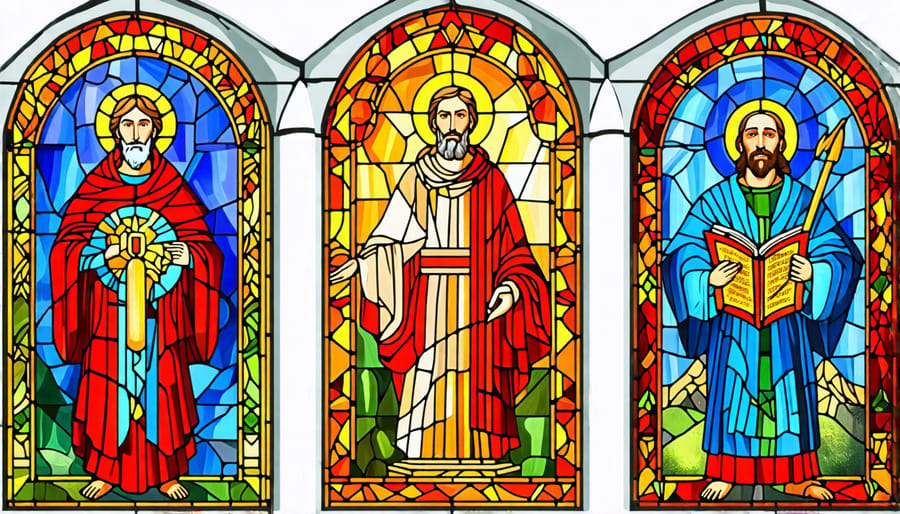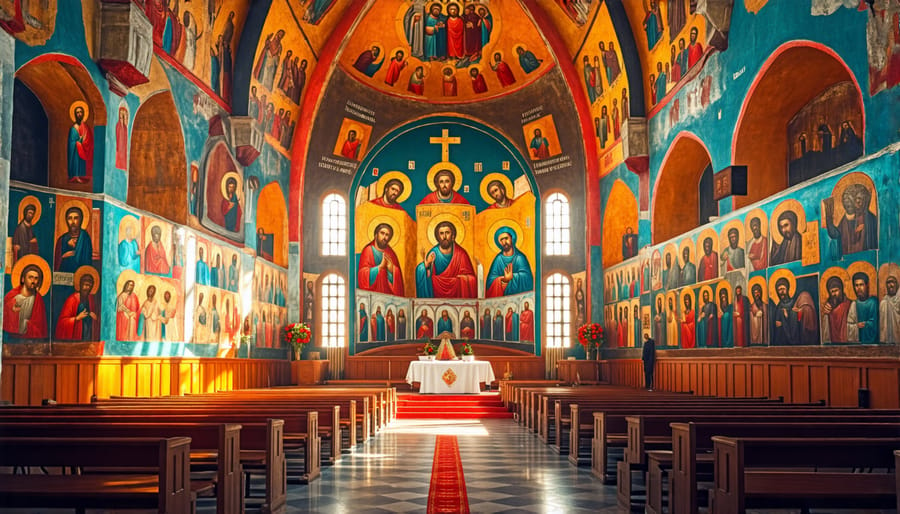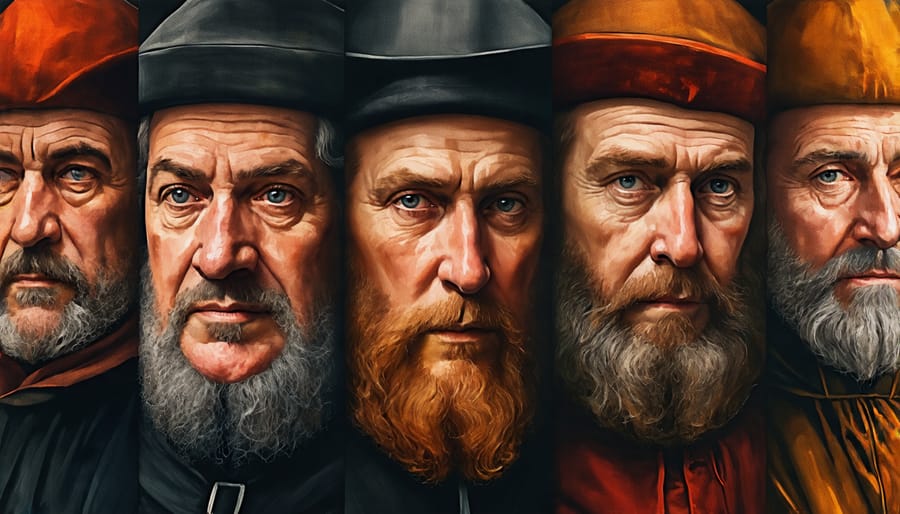Explore the rich diversity within Christianity by examining the faith traditions of Catholicism, Eastern Orthodoxy, and Protestantism. Recognize their shared belief in Jesus Christ while appreciating the unique ways each branch expresses that faith through liturgy, theology, and church structure. Seek to understand rather than judge differences, remembering that all Christians are united in Christ despite variations in practice. Engage in respectful dialogue with believers from other traditions, approaching conversations with humility, curiosity and a desire for mutual spiritual growth. Let the common threads of faith in the Triune God, scripture, and Jesus’ life, death and resurrection bind us together as one Body amidst our beautiful diversity.
Catholic Tradition

Beliefs and Practices
The Catholic faith is rooted in the belief that Jesus Christ is the Son of God, who died for our sins and rose again. Catholics hold that the Pope, as the successor of Saint Peter, has authority to guide the Church. The seven sacraments – Baptism, Confirmation, Eucharist, Penance, Anointing of the Sick, Holy Orders, and Matrimony – are central to Catholic worship and spiritual life. The Eucharist, also known as Holy Communion, is the most important sacrament, where Catholics believe the bread and wine become the body and blood of Christ. Mass is celebrated daily, with the Liturgy of the Word (scripture readings) and the Liturgy of the Eucharist. Catholics also venerate Mary, the mother of Jesus, and the saints, seeking their intercession. They practice devotions such as the Rosary, Stations of the Cross, and Eucharistic Adoration. Catholic social teaching emphasizes the dignity of human life, care for the poor and vulnerable, and the pursuit of justice and peace. While there is diversity within the Catholic tradition, unity is found in shared beliefs, sacraments, and the leadership of the Pope and bishops.
Historical Significance
The Catholic Church, with its rich history and traditions, has played a significant role in shaping Christianity over the centuries. As the largest Christian denomination, the Catholic Church traces its origins back to the apostles, particularly Saint Peter, whom Catholics believe was appointed by Jesus as the first Pope. Throughout history, the Catholic Church has been instrumental in preserving and spreading the faith, as well as influencing art, culture, and Western civilization as a whole.
One of the defining features of Catholicism is its strong emphasis on tradition and the authority of the Church. Catholics believe in the infallibility of the Pope when he speaks ex cathedra on matters of faith and morals. The Church’s teachings, rooted in Scripture and Sacred Tradition, have guided the faithful for generations. The seven sacraments, including Baptism, Eucharist, and Confession, are central to Catholic worship and spiritual life.
The Catholic Church has also made significant contributions to theology, philosophy, and education. Great thinkers like Saint Augustine and Saint Thomas Aquinas have shaped Catholic thought and influenced Western intellectual history. The Church’s commitment to social justice, as exemplified in its extensive charitable works and the teachings of figures like Saint Francis of Assisi and Saint Teresa of Calcutta, continues to inspire Christians to serve others in the name of Christ.
Orthodox Tradition
The Eastern Orthodox Church, with its rich liturgical traditions, iconic art, and profound theology, offers a distinctive expression of the Christian faith. At the heart of Orthodox worship lies the Divine Liturgy, a sacred celebration filled with ancient hymns, prayers, and rituals that engage all the senses. The beauty of Orthodox churches, adorned with vibrant icons of Christ, the Virgin Mary, and the saints, reflects a deep reverence for the sacred and a belief in the transformative power of God’s grace.
Central to Orthodox theology is the concept of theosis, the process of becoming more like God through the purifying and illuminating work of the Holy Spirit. As St. Athanasius famously said, “God became man so that man might become God.” This does not imply that humans become divine in essence, but rather that they participate in God’s divine life and love through the gift of grace.
Orthodoxy also places great emphasis on the role of tradition in preserving and transmitting the faith. The Church’s teachings, rooted in Scripture and the writings of the early Church Fathers, are seen as a living, organic whole that has been faithfully handed down through the centuries. This tradition is not static but dynamic, guiding the Church in its ongoing mission to proclaim the Gospel and transfigure the world.
By immersing themselves in the richness of Orthodox tradition, believers are invited to enter more deeply into the mystery of God’s love and to be transformed by the power of the Holy Spirit. As they participate in the sacramental life of the Church and strive to live out their faith with compassion and humility, they journey together towards the ultimate goal of union with God.

Protestant Traditions
Shared Beliefs and Distinctives
While Protestant denominations share many core beliefs rooted in the Bible, each tradition has its own distinct emphases and practices. Most Protestants affirm the doctrine of salvation by grace through faith alone, the authority of Scripture, and the priesthood of all believers. They celebrate two sacraments: baptism and communion. However, denominations differ in their specific interpretations and applications of these tenets.
Lutherans stress the primacy of God’s grace and justification by faith. Anglicans value liturgical worship and maintain elements of Catholic tradition. Presbyterians emphasize God’s sovereignty and covenant relationships. Baptists prioritize believer’s baptism and local church autonomy. Methodists focus on sanctification and social holiness. Pentecostals highlight the gifts of the Holy Spirit and vibrant worship experiences.
Despite these differences, all Protestant traditions find unity in their devotion to Christ and commitment to spreading the Gospel. As Ephesians 4:4-6 reminds us, “There is one body and one Spirit, just as you were called to one hope when you were called; one Lord, one faith, one baptism; one God and Father of all, who is over all and through all and in all.” By appreciating both our common ground and unique expressions of faith, Protestants can strengthen the bonds of fellowship and work together to advance God’s kingdom on earth.
Historical Origins
The Reformation, which began in the 16th century, marked a significant shift in the Christian landscape. Reformers like Martin Luther and John Calvin questioned certain practices and teachings of the Catholic Church, leading to the emergence of Protestant traditions. These reformers emphasized the authority of Scripture, justification by faith alone, and the priesthood of all believers. As a result, various Protestant denominations arose, each with their own distinct emphases and practices, yet united in their commitment to the core tenets of the Christian faith. Today, Protestantism encompasses a diverse array of traditions, including Lutheranism, Calvinism, Anglicanism, Baptists, Methodists, and Pentecostals, among others. Despite their differences, these traditions share a common heritage in the Reformation and a dedication to spreading the Gospel message of salvation through faith in Jesus Christ. As the Apostle Paul reminds us in Galatians 3:28, “There is neither Jew nor Gentile, neither slave nor free, nor is there male and female, for you are all one in Christ Jesus.” The Reformation’s legacy continues to shape the Christian faith, fostering a spirit of unity amidst diversity and a renewed appreciation for the transformative power of God’s grace.

Conclusion
While there are differences between Christian faith traditions, at the heart of each lies a shared devotion to Jesus Christ and the teachings of the Bible. Catholics, Orthodox, and Protestants all affirm the core tenets of Christianity – the Trinity, Christ’s divinity and redemptive work, and the importance of faith, prayer, and service. By recognizing our common ground, we can foster greater unity and understanding within the diverse body of Christ.
As Christians, we are called to love one another as Christ loved us (John 13:34-35). This includes appreciating the unique expressions of faith found in different traditions. When we approach our differences with humility and respect, we open ourselves to learning from one another’s spiritual practices, theological insights, and experiences of God’s grace. By engaging in respectful dialogue and seeking to understand rather than judge, we enrich our own faith journeys and bear witness to the reconciling love of Christ.
Ultimately, the beauty of Christianity lies in its ability to bring together people from all walks of life under the banner of Christ’s love. As we celebrate our shared faith and learn from our diverse traditions, may we continue to grow in unity, compassion, and devotion to our Lord and Savior.
Reflection Questions
As you reflect on the rich tapestry of faith traditions within Christianity, consider the following questions:
1. In what ways can a deeper understanding of the diverse expressions of Christian faith strengthen your own spiritual journey? How might appreciating the unique perspectives and practices of other traditions enrich your relationship with God and your shared foundation of Christian faith?
2. How can you cultivate a spirit of unity and love within the Body of Christ, even amidst the differences in tradition and practice? What steps can you take to foster genuine dialogue, understanding, and respect among believers from various backgrounds, recognizing that we have much to learn from one another?
3. In light of the diversity within Christianity, how might you approach your own spiritual practices and traditions with a renewed sense of intentionality and gratitude? What aspects of your faith tradition resonate most deeply with you, and how can you embrace them more fully as a means of drawing closer to Christ and serving others in His name?
